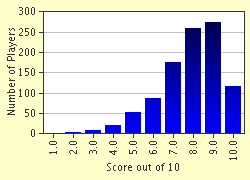Quiz Answer Key and Fun Facts
1. Which is the name of the high and very carefully shaped hairdo which was popular in the late 50s and gradually faded in its importance during the 1960s?
2. Which dance craze and style of music literally meant "new tendency" when translated into English?
3. "If that's your bag." From which original sense of the word "bag" did the meaning of a particular person's interest or expertise actually derive?
4. What additional meaning did the word "busing" gain during the 1960s?
5. What did the name "Charlie" or "Charley" come to mean to U.S.A. troops during the 1960s?
6. With which fashion items did the word "chisel" become associated in the early 1960s?
7. Which two birds became the symbolic representations of hard-liners and peaceful negotiators during the 1960s?
8. What is meant by an "empty-nester"?
9. Which of the following is not a type of pedestrian road crossing in Great Britain?
10. What is the meaning of the Japanese word "shiatsu" which was borrowed into English and first recorded in its written form in 1967?
Source: Author
Philian
This quiz was reviewed by FunTrivia editor
agony before going online.
Any errors found in FunTrivia content are routinely corrected through our feedback system.


